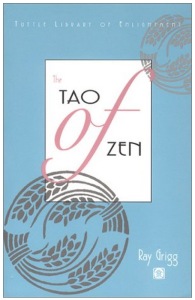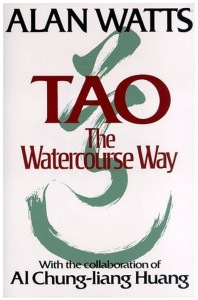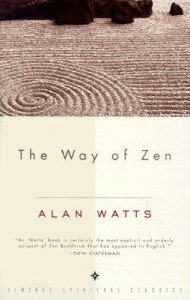- Be As You Are: The Teachings of Sri Ramana Maharishi
- I Am That: Talks with Sri Nisargadatta Maharaja
- The Tao of Zen (Ray Grigg)
- The Book: On the Taboo Against Knowing Who You Are (Alan Watts)
- The Way of Zen (Alan Watts)
- Tao – The Watercourse Way (Alan Watts)
- This is It: and Other Essays of Zen and Spiritual Experience (Alan Watts)
- Still the Mind: An Introduction to Meditation (Alan Watts)
- The Power of Now (Eckhart Tolle)
- God’s Debris (Scott Adams)
Tag Archives: Tao
Stacking Logs
“When stripped of formality and returned to its natural shape, Zen is earthy and ordinary. Nothing special.”

“It is so uncontrived and subtle that it goes nearly unnoticed. And no one can deliberately do it.”

“Taoism and Zen cannot properly be understood, but they can be experienced.”

The Tao of Zen
 “The Tao of Zen is a nonfiction book by Ray Grigg. The work argues that what we recognize as traditional Chinese Ch’an/Japanese Zen Buddhism is in fact almost entirely grounded in Chinese Taoist philosophy, though this fact is well shrouded by the persistence of Mahayana Buddhist institutional trappings. Utilizing an array of scholarly commentary on the two traditions and historical deduction from what can be considered to be the best primary source material available, the author traces the development of Taoism and Buddhism in China and Japan for two millennia.” (Wikipedia)
“The Tao of Zen is a nonfiction book by Ray Grigg. The work argues that what we recognize as traditional Chinese Ch’an/Japanese Zen Buddhism is in fact almost entirely grounded in Chinese Taoist philosophy, though this fact is well shrouded by the persistence of Mahayana Buddhist institutional trappings. Utilizing an array of scholarly commentary on the two traditions and historical deduction from what can be considered to be the best primary source material available, the author traces the development of Taoism and Buddhism in China and Japan for two millennia.” (Wikipedia)
I’ve read this book twice and expect to read it again but I wouldn’t know where to begin to describe it. The Wikipedia link above is a good start. As is my habit with nonfiction, I highlighted as I read: The Tao of Zen (Ray Grigg)
Tao: The Watercourse Way
 Excerpts from Tao: The Watercourse Way by Alan Watts.
Excerpts from Tao: The Watercourse Way by Alan Watts.
The Tao which can be spoken is not the eternal (or regular) Tao.
Our organisms have ways of intelligent understanding beyond words and conscious attention.
The supposition that knowing requires a knower is based on a linguistic and not an existential rule.
Alphabetic writing is a representation of sound. A sign for a sound which is the name of a thing.
Li is the pattern of behavior which comes about when one is in accord with the Tao, the watercourse of nature.
We and our surroundings are the process of a unified field, which is what the Chinese call Tao. #
Technology is destructive only in the hands of people who do not realize that they are one and the same process as the universe.
It is the great and imaginary terror of Western man that nothingness will be the permanent end of the universe. We do not easily grasp the point that the void is creative, and that being comes from nonbeing as sound from silence and light from space.
I find it impossible to conceive any form whatsoever without the component of relatively empty space. […] I cannot get away from the sense that space and my awareness of the universe are the same.
How would you know that you are alive unless you had once been dead? How can one speak of reality or is-ness except in the context of the polar apprehension of void.
There is something in us which may be called upon for a higher wisdom than can be figured out by logic.
The nervous system can integrate more variables than the scanning process of conscious attention.
It is a matter of realizing that oneself and nature are one and the same process. […] The whole cosmos is implicit in every member of it, and every point in it may be regarded as its center.
There is no point in trying to suppress the babble of words and ideas that goes on in most adult brains, so if it won’t stop, let it go on as it will, and listen to it as if it were the sound of traffic or the clucking of hens.
Tao is just a name for whatever happens. […] Yet the Tao is most certainly the ultimate reality and energy of the universe, the Ground of being and nonbeing.
Tao cannot be defined in words and is not an idea or concept.
Verbal description and definition may be compared to the latitudinal and longitudinal nets which we visualize upon the earth and heavens to define and enclose the positions of mountains and lakes, planets and stars. But earth and heaven are not cut by these imaginary strings.
It is basic to the Taoist view of the world that every thing-event is what it is only in relation to all others.
Nature has no “parts” except those which are distinguished by human systems of classification.
The Tao is the pattern of things, but not the enforced law. […] The universe is a harmony or symbiosis of patterns which cannot exist without each other.
Just as every point on the surface of a sphere may be seen as the center of the surface, so every organ of the body and every being in the cosmos may be seen as its center and ruler.
As the universe produces our consciousness, our consciousness evokes the universe.
The only single event is the universe itself.
Pantheism: The idea that the universe, considered as a mass of distinct things and events, is simply God by another name.
But if, as is the case, the Tao is simply inconceivable, what is the use of having the word and saying anything at all about it? Simply because we know intuitively that there is a dimension of ourselves and of nature which eludes us because it is too close, too general, and too all-embracing to be singled out as a particular object.
Taoists do not look upon meditation as “practice,” except in the sense that a doctor “practices” medicine. […] Meditate for the joy of meditation.
“You” cannot go along with “things” unless there is the understanding that there is, in truth, no alternative since you and the things are the same process — the non-streaming Tao. The feeling that there is a difference is also that process. There is nothing to do about it. There is nothing not to do about it. […] In realizing that you are the Tao, you automatically manifest its magic.
As a way of contemplation, (Tao) is being aware of life without thinking about it.
To be anxious to survive is to wear oneself out. […] If, deep down inside, you want most desperately to survive and be in control of things, you cannot genuinely take the attitude of not worrying about it. You must allow yourself the freedom to worry — to let the mind think whatever it wants to think.”
Hebrew, Islamic, and Catholic scholastics, as well as Protestant fundamentalists, are like tourists who study guidebooks and maps instead of wandering freely and looking at the view.
True knowledge can be encompassed only by instinct and by actual experience.
The Way of Zen by Alan Watts
Excerpts from The Way of Zen
I have no other self than the totality of things of which I am aware.
I have somehow become the empty space in which everything is happening.
TAO
The vague, void-seeming, and indefinable Tao is the intelligence which shapes the world with a skill beyond our understanding. … Whereas God produces the world by making, the Tao produces it by “not-making” (growing).
The Tao’s principle is spontaneity. But spontaneity is not by any means a blind, disorderly urge, a mere power of caprice. … A philosophy restricted to the alternatives of conventional language has no way of conceiving an intelligence which does not work according to plan, according to a (one-at-a-time) order of thought.
Hsuan – A metaphorical darkness; the sheer inconceivability which confronts the mind when it tries to remember a time before birth, or to penetrate its own depths.
If the ordinary man is one who has to walk by lifting his legs with his hands, the Taoist is one who has learned to let the legs walk by themselves.
The eye’s sensitivity to color is impaired by the fixed idea that there are just five true colors.
BUDDHISM
Reasonable men will always be capable of compromise, but men who have dehumanized themselves by becoming the blind worshipers of an idea or an ideal are fanatics whose devotion to abstractions make them enemies of life.
The value of emptiness lies in the the movements it permits or in the substance which it mediates and contains. But the emptiness must come first. This is why Indian philosophy concentrates on negation, on liberating the mind from concepts of Truth.
The basic reality of my life is not any conceivable object.
Maya: Things, facts, and events are delineated, not by nature, but by human description, and the way in which we describe (or divide) them is relative to our varying points of view.
–
The formal world becomes the real world in the moment when it is no longer clutched, in the moment when its changed fluidity is no longer resisted.
It is precisely (the) realization of the total elusiveness of the world which lies at the root of Buddhism.
SELF
Any attempt to conceive the Self, believe in the Self, or seek for the Self immediately thrusts it away.
It is fundamental to every school of Buddhism that there is no ego, no enduring entity which is the constant subject of our changing experiences. For the ego exists in an abstract sense alone, being an abstraction from memory. The past from which our ego is abstracted has entirely disappeared.
To one who has self-knowledge, there is no duality between himself and the external world.
(Zen on the Round of birth-and-death) The process of rebirth is from moment to moment, so that one is being reborn so long as one identifies himself with a continuing ego which reincarnates itself at each moment in time.
Nirvana can only arise unintentionally, spontaneously, when the impossibility of self-grasping has been thoroughly perceived.
Buddhism does not share the Western view that there is a moral law, enjoined by God or nature, which is man’s duty to obey.
Smriti (recollectedness) is a constant awareness or watching of one’s sensations, feelings, and thoughts – without purpose or comment. It is a total clarity and presence of mind, actively passive, wherein events come and go like reflections in a mirror: nothing is reflected except what is.
Through such awareness it is seen that the separation of the thinker from the thought, the knower from the known, the subject from the object, is purely abstract. There is not the mind on the one hand and its experiences on the other: there is just a process of experiencing in which there is nothing to be grasped, as an object, and no one, as a subject, to grasp it.
The object itself is just thought. A thought cannot see itself.
Dharmadhatu – The proper harmony of the universe is realized when each “thing-event” is allowed to be freely and spontaneously itself, without interference.
Logic and meaning, with its inherent duality, is a property of thought and language but not of the actual world.
As the sound “water” is not actually water, the classified world is not the real world.
Instead of trying to purify or empty the mind, one must simply let go of the mind – because the mind is nothing to be grasped. Letting go of the mind is also equivalent to letting go of the series of thoughts and impressions which come and go “in” the mind, neither repressing them, holding them, nor interfering with them.
PRINCIPLES AND PRACTICE
The fondest illusion of the human mind: in the course of time everything may be made better and better.
The power of thought enables us to construct symbols of things apart from the things themselves. This includes the ability to make a symbol, an idea of ourselves apart from ourselves. We learn to identify ourselves with our idea of ourselves.
All ideas of self-improvement and of becoming or getting something in the future relate solely to our abstract image of ourselves.
In Taoist and Buddhist thought there is no conception of a God who deliberately and consciously governs the universe. [The Tao, without doing anything leaves nothing undone]
It is part of the very genius of the human mind that it can, as it were, stand aside from life and reflect upon it, that it can be aware of its own existence, and that it can criticize its own processes.
When human beings think too carefully and minutely about an action to be taken, they cannot make up their minds in time to act.
From (such) memories, reflections, and symbols the mind constructs its idea of itself. … The identification of the mind with its own image is paralyzing because the image is fixed — it is past and finished.
The attempt to act and think about (an) action simultaneously is precisely the identification of the mind with its idea of itself.
Whatever we do, and whatever “happens” to us, is ultimately “right.”
To act “without second thought,” without double-mindedness, is by no means a mere precept of our imitation. For we cannot realize this kind of action until it is clear beyond any shadow of doubt that it is actually impossible to do anything else.
There is no necessity for the mind to try to let go of itself, or to try not to try.
“Brushing off thoughts which arise is just like washing off blood with blood.” – Japanese master Bankei
Social conditioning fosters the identification of the mind with a fixed idea of itself as the means of self-control, and as a result man thinks of himself as “I” – the ego. Thereupon the mental center of gravity shifts from the spontaneous or original mind to the ego image. Once this has happened, the very center of our psychic life is identified with the self-controlling mechanism.
As soon as I recognize that my voluntary and purposeful action happens spontaneously “by itself,” just like breathing, hearing, and feeling, I am no longer caught in the contradiction of trying to be spontaneous. There is no real contradiction, since “trying” is “spontaneity.”
One stops trying to be spontaneous by seeing that it is unnecessary to try, and then and there it can happen. … One does not realize the spontaneous life by depending on the repetition of thoughts or affirmation. One realizes it by seeing that no such devices are necessary.
Zen lies beyond the ethical standpoint, whose sanctions must be found, not in reality itself, but in the mutual agreement of human beings.
Zen does not confuse spirituality with thinking about God while one is peeling potatoes. Zen spirituality is just to peel the potatoes.
Zen is neither self nor Buddha to which one can cling, no good to gain and no evil to be avoided, no thoughts to be eradicated and no mind to be purified, nobody to perish and no soul to be saved.
The practice of Zen is not the true practice so long as it has an end in view, and when it has no end in view it is awakening — the aimless, self-sufficient life of the “eternal now.”
As muddy water is best cleared by leaving it alone, it could be argued that those who sit quietly and do nothing are making one of the best possible contributions to a world in turmoil.
To see the world as it is concretely, undivided by categories and abstractions, one must certainly look at it with a mind which is not thinking — which is to say, forming symbols about it. … A quiet awareness, without comment, of whatever happens to be here and now. This awareness is attended by the most vivid sensation of “nondifference” between oneself and the external world, between the mind and its contents — the various sounds, sights, and other impressions of the surrounding environment. … It just comes by itself when one is sitting and watching without any purpose in mind — even the purpose of getting rid of purpose.
The basic position of Zen is that it has nothing to say, nothing to teach. The truth of Buddhism is so self-evident, so obvious that it is, if anything, concealed by explaining it.
Awakening almost necessarily involves a sense of relief because it brings to an end the habitual psychological cramp of trying to grasp the mind with the mind, which in turn generates the ego with all its conflicts and defenses.
What we are, most substantially and fundamentally, will never be a distinct object of knowledge. Whatever we can know — life and death, light and darkness, solid and empty — will be the relative aspects of something as inconceivable as the color of space.
Awakening is to know what reality is not.
So long as one thinks about listening, one cannot hear clearly, and so long as one thinks about trying or not trying to let go of oneself, one cannot let go. Yet whether one thinks about listening or not, the ears are hearing just the same, and nothing can stop the sound from reaching them.
Because the world is not going anywhere there is no hurry. Hurry, and all that it involves, is fatal. For there is no goal to be attained.
The purposeful life has no content, no point. It hurries on and on, and misses everything. It is only when there is no goal and no rush that the human senses are fully open to receive the world. People in a hurry cannot feel.
Making an effort to concentrate on the instantaneous moment implies at once that there are other moments.
The Paomnnehal Pweor of the Hmuan Mnid.
Aoccdrnig to a rscheearch at Cmabrigde Uinervtisy, it deosn’t mttaer in waht oredr the ltteers in a wrod are, the olny iprmoatnt tihng is taht the frist and lsat ltteer be in the rghit pclae. The rset can be a taotl mses and you can sitll raed it wouthit porbelm. Tihs is bcuseae the huamn mnid deos not raed ervey lteter by istlef, but the wrod as a wlohe.

